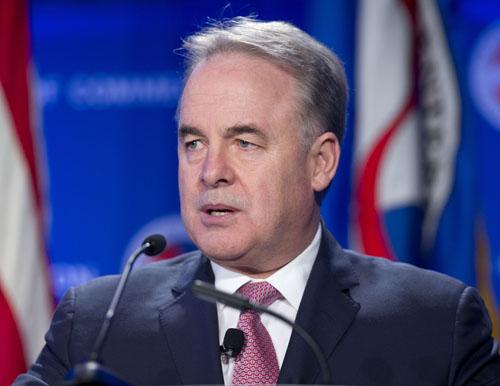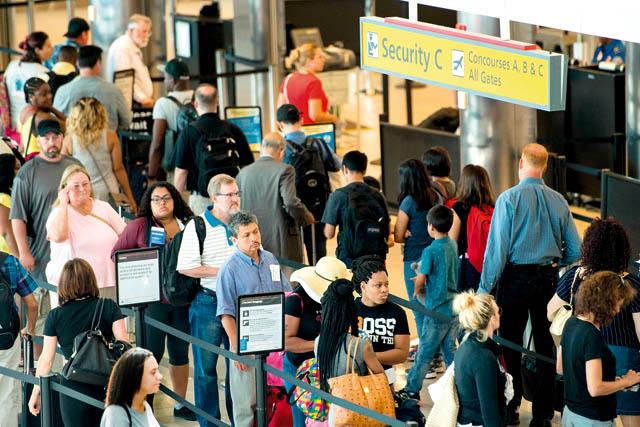You are here
US to chart new territory in Gulf airline subsidy review
By Agencies - Mar 19,2015 - Last updated at Mar 19,2015

WASHINGTON — The Obama administration said Wednesday that it is in the early stages of studying claims that Gulf airlines have received market-distorting subsidies, a review involving uncharted territory for the US government.
No international trade rules or precedent by the United States exists for addressing airline subsidy claims, presenting a challenge for the administration as it determines how to proceed, a person familiar with the matter said.
US airlines contend that Gulf carriers can lower prices and offer more amenities on newer planes because of state subsidies.
These issues do not fall under World Trade Organisation rules but rather under bilateral "Open Skies" agreements that authorise commercial flying between countries.
The agreements are silent on how to handle most subsidy claims, the source said. Yet alleged subsidies of more than $40 billion to Gulf airlines make the claim the largest that the administration has encountered and must be taken seriously, the source added.
Last week, the administration asked US airlines some 20 questions about the allegations.
"The [US government] interagency team did in fact ask the US airlines and their consultants several technical and clarifying questions about the data and information contained in their report," US Department of Transportation Press Secretary Ryan Daniels said in a statement, confirming a Reuters report.
"However, we are in the early stages of thoroughly reviewing this matter in close coordination with our interagency partners," he added.
The Obama administration has filed trade complaints on issues ranging from China's imposition of extra duties on American cars to India's ban on certain US agricultural goods to allegedly protect against avian influenza.
Aviation also has been at the centre of a decade-old dispute in which the WTO found that plane makers from the United States and the European Union had received illegal subsidies.
But Geneva-based watchdog's rules do not apply to air traffic rights or airline services, although it keeps these under review broadly.
Meanwhile, the dispute between US and Gulf airlines has escalated.
Delta Air Lines, United Airlines, American Airlines and their unions on Wednesday called on the administration to request a freeze on additional Gulf-airline flight departures to the United States.
On Tuesday, Emirates airline President Tim Clark promised to rebut the allegations, while Etihad Airways Chief Executive Officer James Hogan said the company received loans, not subsidies, from its government shareholder. Both had arranged meetings with Obama administration officials.
Hogan described the United Arab emirates (UAE) carrier as a "David" battling the US "Goliaths".
Hogan told an aviation industry summit in Washington that airlines everywhere benefit from state support, dismissing the claims of unfair competition by Gulf carriers in a report released by the top three US airlines.
As a battle heats up between Gulf airlines and rivals in Europe and the US, he accused American Airlines, Delta Airlines and United Airlines of themselves hiding behind protection.
"The world's two largest airline markets, the United States and the European Union, are closed, giving their own airlines a huge advantage in scale and scope," he told the US Chamber of Commerce Foundation's 14th Annual Aviation Summit.
Hogan said established aviation giants were built on various kinds of state support, including preferential market access, infrastructure and airports, hardly different from what Gulf carriers Qatar Airways, Etihad and Emirates are accused of.
He also cited the government-backed bailouts of US carriers when they failed.
"Many, many airlines, including many in this room, have benefitted from years of government bailouts, write-offs and loans, everything from bankruptcy protection to covering pension fund obligations, to straight-out financial payments," he indicated.
"Etihad is a David who's been facing Goliaths since 2003," he argued. "The three biggest US airlines working together carry 34 times more passengers”.
In early March, American Airlines, Delta Airlines and United Airlines, along with US airline labour groups, accused the Gulf three of enjoying interest-free loans, subsidised airport charges, government protection on fuel losses, and below-market labour costs that are considered unfair subsidies by the WTO.
Claiming $42 billion in "unfair" subsidies to wrest business away from competitors, they called on the US government to open new talks over bilateral air agreements to address what they said are violations of those pacts, giving the Gulf carriers unfair competitive advantage.
These "multi-billion dollar subsidies" had distorted the marketplace, "to the severe detriment of US employment", the American carriers claimed.
Qatar Airways Chief Akbar Al Baker said on Monday the problem was that the US carriers do not differentiate between what is a subsidy and what is the "legitimate" equity that a state-owned carrier gets.
Delta anyway flies "crap airplanes that are 35 years old," he added.
Noting that any money his airline receives from the state is in the form of "legitimate" equity, Al Baker indicated that his company's fleet of aircraft were much cleaner for the environment in comparison to Delta.
"The unfortunate thing is that because they are so inefficient they want to blame us, whilst we are very efficient, for their failures and drawbacks," he said. "The issue is that they cannot stand the progress the Gulf carriers are making."
UAE Economy Minister Sultan Al Mansouri was quoted as calling them "false and unacceptable" by the Emarat Al Youm newspaper.
However, European carriers have also joined the argument.
Last week, French and German transport ministers called on the European Commission to tackle the issue of subsidies to Gulf carriers.
The French transport minister, Alain Vidalies, said the Gulf airlines were benefitting from "unfair competitive practices".
Related Articles
ABU DHABI — Etihad Airways hit back Tuesday against claims by its US rivals that it receives unfair subsidies, urging Washington to "keep th
DOHA — Qatar Airways Chief Executive Akbar Al Baker said Thursday that his company is helping to create jobs in the US despite an ongoing wa
DUBAI — The United States has ended a four month ban on passengers carrying laptops onboard US bound flights from certain airports in the Mi


















